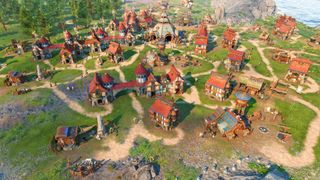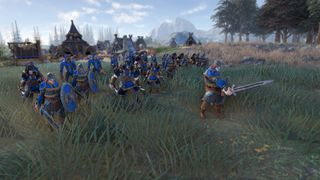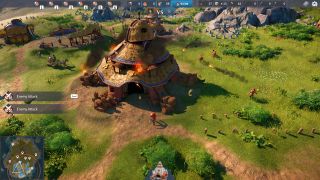This temporary logo takeover heralds the arrival of God of War on PC this week
PC Gamer is supported by its audience. When you buy through links on our site, we may earn an affiliate commission. Learn more
By published
The long-running RTS series has been rebooted, but it doesn’t feel like a reinvention.
Growing an empire is a balancing act. Expand your borders too quickly and you’ll be spread thin, an attractive target for enemy raids. Branch out too slowly and another faction will claim precious resources before you can. Get the balance wrong and you’ll watch your empire burn to the ground.
In the beta build of Ubisoft’s The Settlers I’ve been playing, I’ve watched my empire burn to the ground a whole bunch of times now.
The Settlers is the latest entry in the long running city-building and real-time strategy series, which began way back in 1993 for the Commodore Amiga. There have been six sequels since, plus a number of spin-offs including a free online browser game. The past decade, however, has been a rough one for The Settlers. An eighth game was planned for 2014 but its closed beta was poorly received by players and the game was never completed.
This new reboot has had some problems reaching players as well: it was originally intended to be released in 2019, then delayed until 2020, then postponed indefinitely. At long last, The Settlers is now poised to finally be released in March, with a closed beta planned for January.
The only mode available in the beta I’ve been playing is skirmish mode, where in 1v1 or 2v2 matches against other human players or AI, empires share a landmass on one of two maps and try to conquer it while destroying one another in the process. So far, I’ve usually been the one being destroyed. On the plus side I’ve learned something each time enemy soldiers wiped out my defenses, trashed my buildings, and threw lit torches onto my warehouse until it was a glowing pile of cinders. It’s probably little consolation to all my dead villagers, but each of those flaming failures meant I did a tiny bit better and lasted a little bit longer the next time.
The early game is pretty straightforward. You begin with a handful of units at the edge of the map: engineers to explore and claim new territory, soldiers (some with ranged weapons, some for melee) to protect your turf or wage war with other factions, and villagers to carry supplies to wherever they’re needed. Select buildings from the menu and place them with a click, provided you’ve got the resources, and draw roads to connect buildings to each other. There are sawmills to turn logs into planks, quarries to turn boulders into stone blocks, houses to produce new citizens, and so on. The center of your empire is your warehouse, where your collected resources are stored. You can survive other buildings being burned to the ground, but if your warehouse is wrecked, it’s all over.
That means expanding as quickly as you can—sending engineer units out to widen your borders, claim promising turf, and undertake the lengthy process of surveying areas for signs of buried minerals. At the same time you need to be building farms for wheat and windmills for grain, fishing huts and bakeries for food, ranches to produce donkeys to speed up the transportation of goods or to create delicious steaks that can boost the output of some of your buildings. (A full belly makes workers more productive.) It’s a lot to manage while also keeping an eye out for the other AI or human players. They’re somewhere on the map and they’re just as busy as you are.
The real problem with the engineer units is simple: they can’t fight but they can be killed. Which means if you send them out on a sprawling expedition to find iron and expand your territory, you should consider sending soldiers along with them for protection. Not only can soldiers from another faction find and kill your engineers, but there are bandit camps dotting the map as well that pose a threat if they’re blundered into. On the other hand, if you send your soldiers away from base camp to escort your engineers, who will defend against a raid? Again, the big balancing act common to many RTS games.
I finally found some success with a military strategy I like to call «Do what my enemy is doing, but do it first.» After a raid on the western edge of my territory, I placed two defensive towers and guarded them with soldiers until they were built. Then I sent all of my soldiers on a long, looping path east before turning them southwest again. When the next raid arrived at my towers, I ignored it and sent my soldiers deep into enemy territory. There was no army to fight because they were busy on my turf trying to burn my stuff. Rather than taking down my enemy’s defensive towers I skirted around them and began lobbing torches onto the warehouse. Meanwhile, the enemy soldiers had finally destroyed my towers, but taking the time to do that meant they hadn’t burned my warehouse as much as I’d burned theirs. Victory at last.
But the hustle and bustle of building and quick expansion isn’t my preferred way to create an empire (in general, I’m drawn to city-builders more than I am RTS games). I like a bit more time to plan and manage and expand a bit more slowly. So I’m looking forward to The Settlers’ campaign mode which unfortunately isn’t included in the build I’ve been playing. The campaign will have a storyline, different characters and allies to meet, and different biomes to build in like arid deserts and lush green pastures. There will also be an onslaught mode (this wasn’t in the beta I played either) where players can use skirmish maps with custom settings like fewer resources or more enemies for a greater challenge.
The Settlers will release (hopefully for real this time) on March 17. A closed beta is planned for January 20-24. For a chance to get in on it, you can register here.
Chris started playing PC games in the 1980s, started writing about them in the early 2000s, and (finally) started getting paid to write about them in the late 2000s. Following a few years as a regular freelancer, PC Gamer hired him in 2014, probably so he’d stop emailing them asking for more work. Chris has a love-hate relationship with survival games and an unhealthy fascination with the inner lives of NPCs. He’s also a fan of offbeat simulation games, mods, and ignoring storylines in RPGs so he can make up his own.
Sign up to get the best content of the week, and great gaming deals, as picked by the editors.
Thank you for signing up to PC Gamer. You will receive a verification email shortly.
There was a problem. Please refresh the page and try again.
PC Gamer is part of Future US Inc, an international media group and leading digital publisher. Visit our corporate site.
© Future US, Inc. 11 West 42nd Street, 15th Floor, New York, NY 10036.









